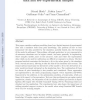304 search results - page 16 / 61 » How good are support vector machines |
BMCBI
2008
13 years 7 months ago
2008
Background: Mass spectrometry is a key technique in proteomics and can be used to analyze complex samples quickly. One key problem with the mass spectrometric analysis of peptides...
ISCI
2008
13 years 7 months ago
2008
This paper considers nonlinear modeling based on a limited amount of experimental data and a simulator built from prior knowledge. The problem of how to best incorporate the data ...
ICCV
2007
IEEE
14 years 2 months ago
2007
IEEE
Kernel classifiers based on Support Vector Machines (SVM) have recently achieved state-of-the art results on several popular datasets like Caltech or Pascal. This was possible by...
ICPR
2008
IEEE
14 years 2 months ago
2008
IEEE
Support Vector Machines (SVMs), though accurate, are still difficult to solve large-scale applications, due to the computational and storage requirement. To relieve this problem,...
NIPS
2000
13 years 9 months ago
2000
The Vicinal Risk Minimization principle establishes a bridge between generative models and methods derived from the Structural Risk Minimization Principle such as Support Vector M...


